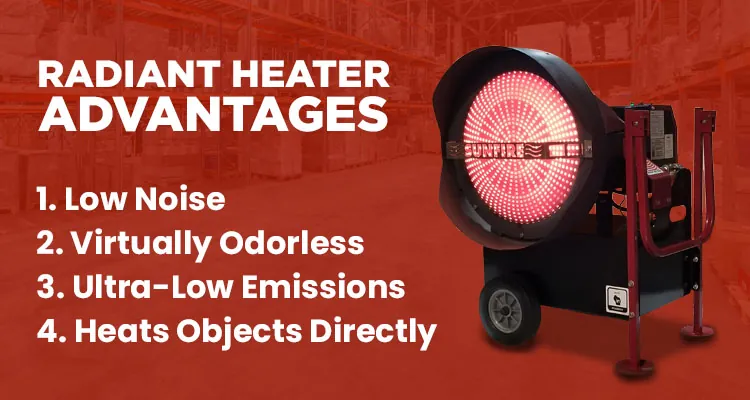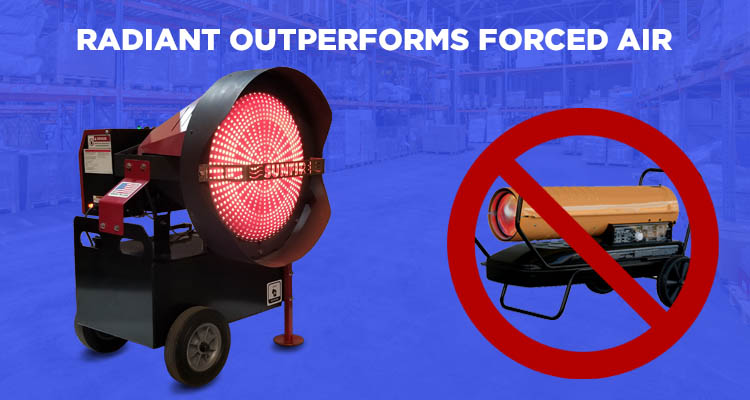Top 4 Advantages of Portable Radiant Heaters

Fuel-fired radiant heaters offer several major advantages compared to traditional portable heaters many have used for commercial applications. Typical force air portable heaters are commonly called torpedo, salamander, and bullet heaters for their oblong shape that looks a bit more like a missile and come with several disadvantages.
Radiant Heaters solve the disadvantages with these heaters and offer four major advantages for a better hating experience. So let’s get right to them:
1. LOW NOISE
A fuel-fired radiant heater offers huge reduction in noise compared to torpedo-style heaters that sound somewhat like a jet engine. Eight hours of that on a daily basis throughout winter can be quite challenging. In addition, it makes communication between anyone near those heaters nearly impossible. Radiant heaters do not require air to travel at high speeds to burn the fuel to reach a high BTU. The speed is so low that you will not feel a breeze of air when standing in front of the heater. When standing in close proximity, employees and friends can have excellent communication without having difficulty hearing each other.
2. VIRTUALLY ODORLESS
Radiant heaters will offer an experience where very little if any odor at all is emitted from these fuel-fired heaters. This makes it a much better option for indoor commercial heating applications where portable and supplemental heat is needed. Especially for shops, garages, and warehouses. Imagine being able to add heat to your shop without the worry of finding constant ways to dissipate the strong odor associated with many of the forced air heaters.
3. ULTRA-LOW EMISSIONS
Both radiant heaters and traditional forced air heaters emit low amounts of carbon monoxide into the air. However, radiant heaters burn so clean that the emissions are near zero. For instance, the SunFire 150 Portable Radiant Heater, emits only up to 1 parts per million of carbon monoxide. The standard from OSHA during an eight-hour period is 50 parts per million. Having the ability to offer near zero emissions at up to 1 parts per million can give an incredibly improved experience when one compares all of the health advantages available.
4. HEATS OBJECTS DIRECLY
The disadvantage to forced air heaters is that the air must first be heated by the flame and then the air passes over or around an object where another process of heat transfer takes place. But there is always a loss of heat with every step of heat transfer making it less efficient. In addition, when air is blown over an object, there is another event that takes, evaporation of moisture. For certain applications, especially with any type of drying and curing involved, this can cause issues with cracking due to rapid loss of moisture.
Although traditional forced air heaters also heat air that will easily heat an indoor space, they will also heat any object directly in front of the heater. They include a dome in front that can easily reach temperatures above 1500 degrees that glows bright red or orange. And similar to the sun, waves of infrared radiant energy will warm anything directly in front of the heater without the assistance of air. It’s essentially an energy-efficient direct heat transfer process, surpassing the efficiency of forced air heaters This provides and exception heating experience in any applications with any type of wind as the waves of radiant heat will be unaffected. This allows objects to be easily warmed under such conditions and offers a much slower rate of moisture evaporation during any curing/drying process.

In conclusion, traditional forced air heaters typically include an intense loud noise when running, a strong odor, and a less efficient method of heat transfer. These 4 advantages will give you another option to consider when looking for a new portable heating option for your commercial application, whether for indoor or outdoor use. To find the perfect radiant heater for your needs, explore SunFire products on the SunFire Heaters website. For a quick and convenient purchase, you can also check out SunFire products at your favorite online retailers.